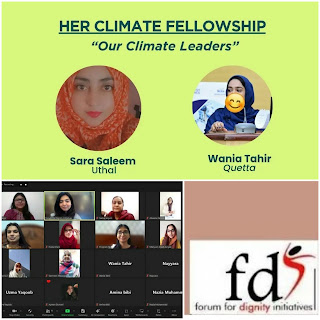Her- Climate Fellowship, Empowering Women as Leader in Local and Global Initiatives
FDI is a forum for study and activism that supports Pakistan's sexual and gender minorities. FDI was founded in 2013 with the goal of empowering women, young people, and transgender people and fostering their safety, well being, equality, and fearless futures. Among FDI's objectives are capacity building, awareness raising, legal rights advocacy, and research.Her Climate Fellowship is 5 days training of 25 successful young Climate leaders around the Pakistan.1st Cohort recruited passionate participants from four provinces and federal territory. The Cohort took place from 1st March 2024 to 5th March 2024, where top trainers trained the participants will interactive activities.The participants trained about Climate Consciousness and Climate Literacy. The concepts of GHG (Green house Gas) Emissions, Ozone layer, water bank.The core concept of Climate Change was discussed from scratch, Causes of Climate change, effect of Climate Change on human and other organisms, Climate Finance, GBV(Gender Based Violence) and SHRH (Sexual and Reproductive health and Right) challenges was explained by the trainers. As The climate crisis have negatively
impacts Sexual and reproductive health and the ability to realize fundamental human rights was considered as top agenda. innovative measurements we discussed which can be taken as a young policy makers. They trained that Innovation in climate change can take many different forms, from policies to technologies. And climate innovation is needed in many sectors of our economy. The unjust policies of the western world which are defined by not paying attention were also highlighted by the trainers. The main objective of the fellowship program was to bridge the Gender Gap in Climate Action and the rising role of women in Green innovation. As there will be no Climate justice unless we don’t have Gender Justice. Participants learned about the effects on transgender people and women, who have historically been the most marginalized communities, with compassion. Trainers highlighted the idea of transgender vulnerability for the first time amid a catastrophe brought on by climate change, such as floods, powerful earthquakes, extreme heat waves, etc. found out about the challenges the women had during the crisis. Like, inadequate nutrition, lack of sanitary pads and other menstruation supplies, and medical assistance for expectant mothers are just a few examples. Trainers involved technology and interactive games sessions to keep the participants active during the 3.5 hour session.Pink Tex was discus as new terminology for the participants. Participants learned to improve both personal and collective resilience.
In order to mitigate the effects of climate change, we must improve HEALTH SYSTEMS, especially SRHR services, and make sure that GBV response protection services are more robust. In order to address the needs of individuals affected, displaced, and at risk of climate crises, we must guarantee better preparedness and response in emergencies. In order to be adaptive and resilient to climate change, we require stronger data systems. Dis-aggregated population, health, and gender data must inform climate-related vulnerability assessments and action in order to reflect the various and distinct impacts of the climate crisis, including evaluation of the impact on SRHR.Social status and identity-related factors are perceived as overlapping and intersecting marginalization drivers. To address current disparities in SRHR and optimize its potential to support the development of adaptive ability and resistance to climate change, an inter-sectional approach is important. In order to increase resilience to climate change, WE NEED TO ADDRESS the underlying patterns of inequality and incorporate SRHR into adaptation responses.An important point of contact between SRHR and climate change is gender-based violence (GBV), which calls for appropriate programming, policy, and action. It is recognized that GBV rises during periods of stress, scarcity, and instability, such as those that follow natural disasters and pandemics. Adaptation to climate and resilience Action to stop GBV and harmful activities must be supported by policies, goals, and funding.Since today's youth are driving climate action, they must be actively involved in official policy-making processes. Especially in front-line communities, it is imperative that no one be left behind when it comes to climate justice, particularly young people.
In addition to offering financial support to youth innovation on climate change adaptation responses, including those pertaining to human rights, gender equality, and sexual and reproductive health, climate adaptation needs to ensure meaningful youth engagement in the design and implementation of climate policies. The day five of fellowship ended with the presentation by all the participants. All in all it was amazing experience, Hopefully every individual will play their part to work for Climate concern.

Comments
Post a Comment